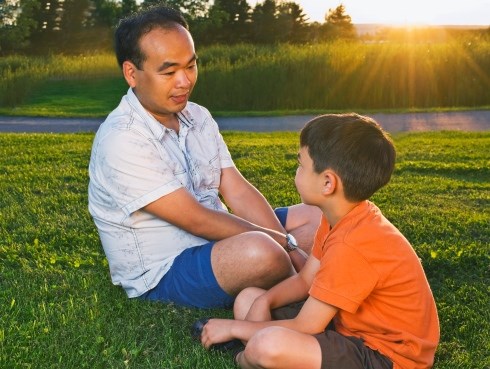
I was aghast when I read that a 20-year old who was babysitting for a 5-year old could not make macaroni and cheese from boxed ingredients! Her parents felt guilty about lapses in child rearing. Later, I read how discovery math is causing heartache for a lot of parents, because their grown children cannot calculate their monthly expenses to check if they exceed their income. But nowhere did I read about parents agonizing that their children got little or no spiritual guidance growing up.
Of course parents are busy these days. Between both parents having jobs, doing shopping, cooking, cleaning, emailing, getting distracted by media, and a whole host of things vying for attention, who has time for spiritual guidance for children, or to talk much about “right and wrong” with children?
But if one really thinks about it, there are indeed many opportunities.
I am reminded of a story about a man visiting his friend’s family. He asked a question of the 5-year old daughter who had received a puppy as a gift the previous Christmas. “Do you love your puppy as much as you love your brother?” The 5-year old replied, “I like my brother, he is OK. But I really love my puppy.” Right there, you have an opportunity.
I find some parents intimidated by the word “spirituality”. Some think it is for adults only. Others feel intimidated by its association to religion. They are not sure if it means ethics, virtues, or knowing right from wrong.
The best thing to do is to set aside the analysis. We just want our children to grow up with a set of values that guides both their thoughts and actions in an ethical way, where the outcome is based on doing what is right not only for oneself, but for the family, for the community, for the world and for nature.
One may say that is a tall order. But we can start simple and progress, reaching higher ground at every step. We can use stories, illustrations, and games. We can practice actions and speech. We can be good role models. There is lots of information out there. A considerable amount of spiritual knowledge is naturally linked to religion, since religious groups and religious leaders did much of the crystallization of spirituality.
Let us start with bringing back respect for parents, elders, and teachers. This is one of the basics in Hindu spiritual teachings. In Hinduism, parents and teachers are equivalent to God. How about love and respect for family, friends, neighbors? In Hinduism, there are lots of mythological stories about God-like children, and stories about Gods themselves as children (for example, Lord Krishna’s childhood stories).
Spirituality involves not only doing good, but also not doing harm. That should be the first lesson to any child wanting to go online, or wanting to play video games.
We can teach right and wrong to children at a young age. There could be missteps along the way, but that is part of life.
Another extremely important aspect is what I call managing the “I want” factor. This includes helping children to resist the onslaught of marketing that uses peer as selling tactics.
Bottom line: If we don’t do something about it, our next generation will pay a price for our neglect of their spiritual welfare.
Suresh Basrur practices the Hindu faith, participates in inter-faith activities in Victoria and speaks to audiences about Hindu religion, philosophy and practices.
You can read more articles from our Interfaith Blog, Spiritually Speaking HERE
.


